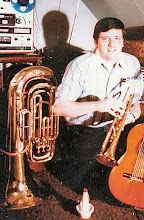

1981 JUCU Records SV 1946 Stereo
Side One
1. When You're Smiling
2. Scatterbrain
3. Just Friends
4. S-H-I-N-E
5. Maria Elena
Side Two
1. Moonlight and Shadows
2. Rain Ford
3. Oh, Lady Be Good
4. Minkey
5. Honeysuckle Rose
Liner Notes:
Clarinet: Pete Fountain
Amplified Marimba: Frank Flynn
Drums: Jack Sperling
Guitar: Bob Bain
Bass: Ray Leatherwood
Arranger and Producer - Frank Flynn
Recording Engineer and Co-Producer - Phil A. Yeend
Microphones used were: AKG-414 on Clarinet, three U87s on Drums, SM-53 on Bass, SM-53 on Guitar, and SM-53 on Amplified Marimba.
Mixing Console API 24 Track Automated Console Recording on 3M-M79 16 Track Tape Machine Recorded on Scotch 250 Tape
PETE FOUNTAIN'S JAZZ REUNION
How sad the realization that the pure, unadulterated, toe-tapping, finger-snapping brand of jazz contained herein may soon be added to the list of endangered species.
Not that I want to sound like the voice of doom, but considering this overdubbed era - a time in which more attention is lavished on electronic gimmickry than on musical integrity - an honest jam session like this sticks out like a healthy thumb.
Perhaps its most refreshing aspect is the unabashed return to basics, and considering it was conceived in liberty and dedicated to the proposition that all jazzmen are creatively equal, this Bicentennial year bash provides an eloquent argument to "know thy roots."
Pete Fountain's roots can be summed up by stating his birthplace: New Orleans. But he is young enough and also versatile enough to have been able to steer his clarinet away from Dixieland exclusively and expand its sound to the domain of the straight ahead. So straight ahead that he was once a featured part of the Lawrence Welk band.
This session will convince jazz buffs that Pete Fountain belongs in this particular setting: as a leader of a group that can tackle any idiom - from two-beat to off-beat, to the refreshingly modern group dynamics of this album.
As for Frank Flynn's background, it's necessary only to point out that for years he was George Van Eps' musical alter ego, and you get an accurate picture of his no-nonsense approach to jazz. A New Yorker by birth, his experience runs a gamut from arranging for Ben Pollack and playing drums and singing for Ted Fio Rito to playing vibes in the studios.
Thus we have a "front line" of like-minded swingers devoted to the joys of jazz, backed by a formidable rhythm machine devoted to the infectious pulse of jazz. That rhythm machine - a well honed section that could easily form a jazz entity all its own - consists of Bob Bain, one of the studio's busiest guitarists; Ray Leatherwood, whose walking bass lines provide a firm melodic underpinning; and the sterling Jack Sperling, a drummer who swings so sensitively that he never over shadows his colleagues. The results are not merely a happy, bouyant reunion for Pete and the musicians with whom he used to work in Hollywood, but a spontaneous outpouring of Jazz U Can Understand. (Viola, JUCU!)
It doesn't require a doctorate in musicology to hear the many high points: like that rhythmic phrase of Pete's in When You're Smiling; or resuscitating an inconsequential oldie such as Scatterbrain to show how good improvisers can always rise above material; and how about the drive that builds on Shine? By the final chorus, Frank's marimba is doing more than coping: he and Pete are laying down independently swinging lines.
On Side Two, did you ever hear Moonlight and Shadows taken at such a bright tempo? And for simplicity - which is the essence of jazz - could anything be more effective than those introductory cushions Frank provides for Pete on Rain and Lady Be Good? If you're not familiar with Minkey, you're not alone: Pete and Frank fashioned that blues and named it for Pete's grandson. Going out in style, Honeysuckle Rose features an exercise in counterpoint that proves jazz can cerebrate as well as celebrate.
It's a most satisfying reunion: Pete draws from his Fountain of youth, and to be Frank, the resulting sounds are "in like Flynn."
Harvey Siders Jazz Critic,
Los Angeles Herald-Examiner


No comments:
Post a Comment